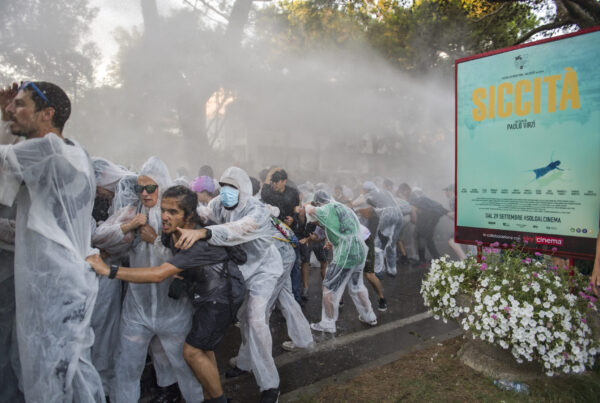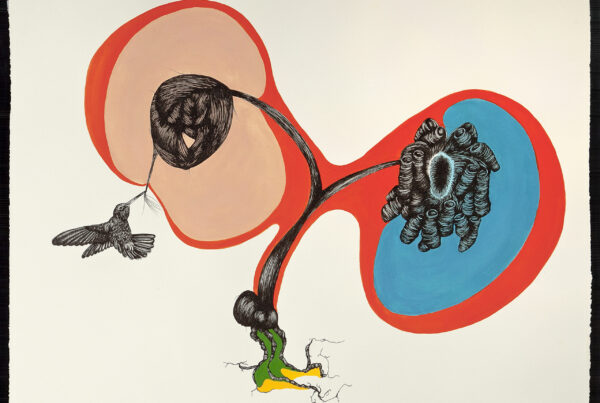by Ilenia Iengo, Paola Imperatore and Emanuele Leonardi
A new bilingual series in Italian and English invites us to follow and learn with a long season of mobilizations arising in Italy from the 1970s to the present, building bridges across the knowledges and practices of political ecology.
Starting from the territorial resistances against pollution, extractivism, and environmental injustice that have marked the political history of the last 30 years of the country and intersecting with new mobilizations for climate justice, ecotransfeminism, and working-class ecology, this series aims to provincialize political ecology in Italy as an emerging and transformative field of social movements organizing. The desire to share this emergence with a wider audience of activists and scholars has pushed us to reread, invite and propose a selection of contributions, reflections and analyses to provide an evolving cartography of resistances and struggles in Italy. Keep your eyes peeled for the upcoming contributions!
Gela, Niscemi, Augusta, Taranto, Brindisi, Naples, Caserta, Cagliari, Manfredonia, Rosignano, Casale Monferrato, Seveso, Porto Marghera, Brescia, Val Susa and Vajont, are just some of the territories where the Italian state, together with polluting industries (petrochemical, steel, etc.) and the disposal of their waste, has left the traces of an inherently ecocidal capitalist development. From these territories, resistances and experiences have emerged and highlighted the nexus between health and the environment and the need to produce alternatives to the dominant narrative that normalizes the damages imposed to human and more-than-human health; from factories through the blackmail between health and labor, to urban suburbs where people cannot breathe due to the incineration of hazardous waste, or the mountain valleys where modernity is often synonymous of large, unnecessary and harmful developments like dams and high speed trains.
Two threads of grassroots movements and critical perspectives are mobilized in the complex geography of territorial, environmental and climate justice struggles in Italy. These are not antithetical or exclusionary, but they allow us to outline some of the peculiarities of this history. On the one hand, since the 1970s working-class environmentalism with its history of struggles for workers’ health in relation to the exposure to harmful substances, has overturned power relations in the factory, centering the politicization of those who experience industrial damage on their bodies, against the logic of compensation, and towards a policy of prevention.
On the other hand, there is the prospettiva meridiana (southern perspective) on environmental injustice, which emerges from the struggles against ecocidal development projects at the margins of the nation, such in the south and the islands. Since the 1980s, the promise of prosperity that would emanate from modernity has begun there, earlier than elsewhere, to show its stark contradictions. But the dominant discourse of capitalist growth as a source of wealth redistribution across the country could not entirely convince subaltern territories and communities. The southern perspective on political ecology in Italy arises from those territories and among those communities that defy the principle of sacrifice and resist the normalization of emergency management, re-appropriating collective forms of struggle and life, and building critical knowledges and alternative horizons. The radical power of subversion flourishes in marginality, as bell hooks has taught us. In this context and particularly from 2019, political ecology meets climate justice in grassroots experiences in Italy.
2019 is a pivotal year because it breaks the neoliberal tale that environmental protection can go hand in hand with capitalist profit-making. In fact, the counterrevolution of elites, beginning in the second half of the 1970s, brought with it some fundamental environmental policy guidelines. The strategy was twofold. At first, in the absence of a development perspective capable of transforming the ecological problem from an element of crisis to an opportunity for profit, the response to the working-class protagonism in the previous decade was the reversal of the social divide. If up to that point the dynamic had been towards the narrowing of the social divide, from then onwards class polarization would begin to grow again. Later, with the rise of neoliberalism and the collapse of the USSR, inequalities continued to rise but the discursive background changed. The idea of sustainable development indicated a possible compatibility between economic growth and care for the environment, while the green economy went one step further: the ecological crisis was no longer to be considered an obstacle to development, but rather a fundamental condition of its possibility.
In other words, the green economy is an attempt to adapt the environmental constraint to capital accumulation by transforming it from a barrier to a driver of value. It is a strategy that relies on the creation of ad hoc markets, such as those in which permits and emission credits can be traded. Here it is that magically one can postulate an elective affinity between the logic of profit and the logic of environmental protection. As early as 1988, in the pages of Primo Maggio magazine, Sergio Bologna noted how much capitalism needed environmentalism to reach the frontier of a new industrial revolution. The reversal is thus served. Half a century ago the first wave of environmental noxiousness (in particular waste and pollution) became a political issue for social and workers’ struggles. Instead, since the 1990s we have witnessed the neoliberal management not only of noxiousness, but also of the second wave of ecological damage (biotechnological hazards, geoengineering and climate change). This has been the pattern from the Kyoto Protocol (1997) to the Paris Agreement (2015): although global warming represents a market failure to account for so-called negative externalities, the only way to deal with it is to establish other markets to trade nature-goods (e.g. the ability of forests to absorb CO2). These are not forays into abstract theorizing: flexible mechanisms that commodify the climate are still the main economic policy tool used by the UN Framework Convention on Climate Change. Despite decades of climate negotiations, more climate-altering gases have been emitted in the last 30 years than from the 18th century to 1990. This clearly shows the contradiction between the (supposed) ecological ends and the (actual) economic means of environmental markets. In fact, although no ecological improvement has been achieved through these markets- even the most enthusiastic advocates do not claim otherwise – an enormous amount of money has been transferred to shareholders of industries that, ironically, often belong to the fossil energy sector.
Moreover, in March 2020, we had new evidence of the failure of this logic. While, of course, it was not environmental mismanagement per se that generated the Covid-19 virus, we know for certain that its spread is related to deforestation and destruction of ecosystems that promotes the spillover of pathogens between wild and domesticated animals, through which they reach humans (zoonoses); while the speed of transmission is related to the rapidity of movement of (naturally wealthy) people and goods, which have turned this process in a global-scale pandemic in a matter of weeks. In addition, pre-existing air pollution -already mostly affecting marginalized communities– made people more vulnerable to respiratory infections and COVID-19 mortality, leading to a steepening curve of infections and deaths in a short timeframe, with a healthcare system already deeply gripped by a systemic shortage of medical personnel and beds, as well as protective equipment and pulmonary ventilators. In this sense, the pandemic has been the irrefutable proof of how structurally ill this system is and how the ecological issue cuts across all areas of our lives. The managerial and profit-oriented management of nature proved to be the ideal recipe for disaster.
While the Italian government seemed to want to get off on the right foot by initiating a program of ecological transition through the recovery funds, the events that followed clearly showed the intention to turn the ecological transition into a new opportunity for the accumulation and exploitation of private capital, the costs of which – once again – would be dumped on nature and working-class communities. From an opportunity to reverse course, the pandemic multiplied existing processes of violence, which reverberated more heavily on the most vulnerable subjectivities, highlighting the deep connection between the health and the ecological crises. In fact, the government continued its interlocutions with the country’s major energy and arms companies, which are responsible for ecological degradation, the climate crisis and the military and colonial policies pursued in defense of strategic assets. In the meantime, these very corporations, after receiving lavish public aid without any conditions, were preparing to leave the country and relocate in the name of the ecological transition and competitiveness of other markets compared to the Italian one.
If already by 2019 the market-based model for governing the climate crisis was crumbling under the pressure of old and new movements, from territorial struggles to Fridays for Future and XR, the latest mobilizations proved that the ‘top-down ecological transition’ has not been able to deliver its own pretentious promises. While climate-altering emissions, heat waves, droughts and fires continue to relentlessly grow, social rights are also being attacked. The day after the Italian government unlocked the possibility to terminate contracts, several companies, such as GKN Driveline, rushed to pack up and leave, taking with them the profits shouldered by the very workers that, during the lockdown, were considered essential. These companies left behind a desert made of empty buildings and workers without guarantees nor rights, who are forced to face the increasing costs of living, war, and continuous attacks on the meagre existing social measures. This chain of processes has been highlighted and acted upon synergistically by climate justice and workers’ movements, whose alliance proved fundamental to the achievements of the 1970s but then overwhelmed by neoliberal restructuring of capitalism.
Particularly, the GKN Factory Collective, protagonist of numerous mobilizations instigated by the collective firing of July 9, 2021, opened up to a radical scenario of convergence and insurgency capable of undermining and deconstructing the environment-labor dichotomy and building a social conflict capable of putting back at the center the 99% of the Occupy movement in Wall Street. From the recovery of the working-class ecology tradition, to the convergence with Fridays for Future, and from the rejection of war, to the convergence with the lgbtqia+ & Disability network “Stati Genderali”, the Factory Collective has opened a valuable space for discussion in the working-class world and for collective mobilization with two key dates. Namely, in March 26, 2022 in Florence, immediately after FFF’s Climate Strike on March 25, the climate justice movement took the streets with the slogan “We are insurgent nature”. A few days later, on October 22 in Bologna, mobilisations focused on the nexus between public and sustainable mobility, towards which the Factory Collective is initiating an industrial reconversion, against major development works (such as the new highway plan in Bologna) and with networks for food sovereignty, the importance of which is even more evident in the midst of the price and supply crises for basic necessities such as wheat, and the nefarious consequences of droughts and heat waves that have ruined many crops. Just few days later, on November 5, the Insurgent South will flood the streets of Naples in a convergence of movements such as GKN Factory Collective, the historical organized neapolitan movement of the unemployed Movimento di Lotta Disoccupati “7 Novembre”, Fridays for Future Napoli and the Noi non paghiamo network against the increasing prices of bills and food.
On the other hand, climate strikes globally have posed, in a new way, a similar political question: given the failure of the market to curb polluting emissions, how do we rethink environmental protection not at the expense of justice but through an effective fight against inequalities? In this conjunction between a typical theme of public intervention in the economy – such as the social inclusion of the working classes – and the exhaustion of a ‘plan’ as the expression of the ‘infinity and gratuitousness’ of the biosphere, lies the originality of climate justice as a strategic horizon aiming to intervene on the environmental crisis. The project of GKN’s industrial reconversion from below represents here a first and central political laboratory. In fact, the Factory Collective, together with a network of academics, has drawn a plan for the ecological reconversion of the plant, proposing the creation of a Sustainable and Public Mobility Hub. At the heart of this reconversion project is not only the rethinking of the working-class’ role in the ecological transition, driven by the idea of subordinating production to environmental and climate standards and to the social utility of what is produced, but also a profound reasoning about the relationship between different knowledge systems and the synergy between workers’ and academic knowledges. A point that, as we know, is central to political ecology because of its ability to overturn dominant patterns of elaboration and action.
To imagine an ecological transition with such perspective, means it wil be marked by strong conditionalities: in order for it to work, it must present itself as ecological, democratic, popular, transfeminist, anti-colonialist and anti-racist.

The march from the Venice Climate Camp headed to the Venice Film Festival, 10 September 2022. Credits: Michele Lapini Photography.
Ilenia Iengo is a scholar-activist Marie Sklodowska Curie WEGO-ITN PhD fellow in Feminist Political Ecology funded by the European Union’s Horizon 2020 research and innovation programme under the Marie Sklodowska-Curie grant agreement no. 764908at the Barcelona Laboratory for Urban Environmental Justice and Sustainability, ICTA-UAB. Her action research is situated in the Southern European city of Naples with a focus on emancipatory urban politics and imaginaries sprouting at the intersection of transfeminism and environmental justice. Her work is published on Environmental Humanities, Journal of Political Ecology and Environmental Justice. She is a member of Undisciplined Environments and Ecologie Politiche del Presente collectives.
Paola Imperatore is a research fellowship at the University of Torino and she works on political conflicts and social movements, in particular related to the defense of the environment against the construction of large-scale infrastructures or harmful and polluting industries, and on political ecology. She is an activist engaged in climate justice and antimilitarist movements.
Emanuele Leonardi is a scholar-activist working at the University of Bologna. His research interests include: climate justice, environmental labour studies and working-class ecology. He is a member of the research group POE – Politics, Ontologies, Ecology
Top (feature) image: Convocatoria Ecologista in Taranto, August 26-29, 2022. Credits Ilaria Lupo.




